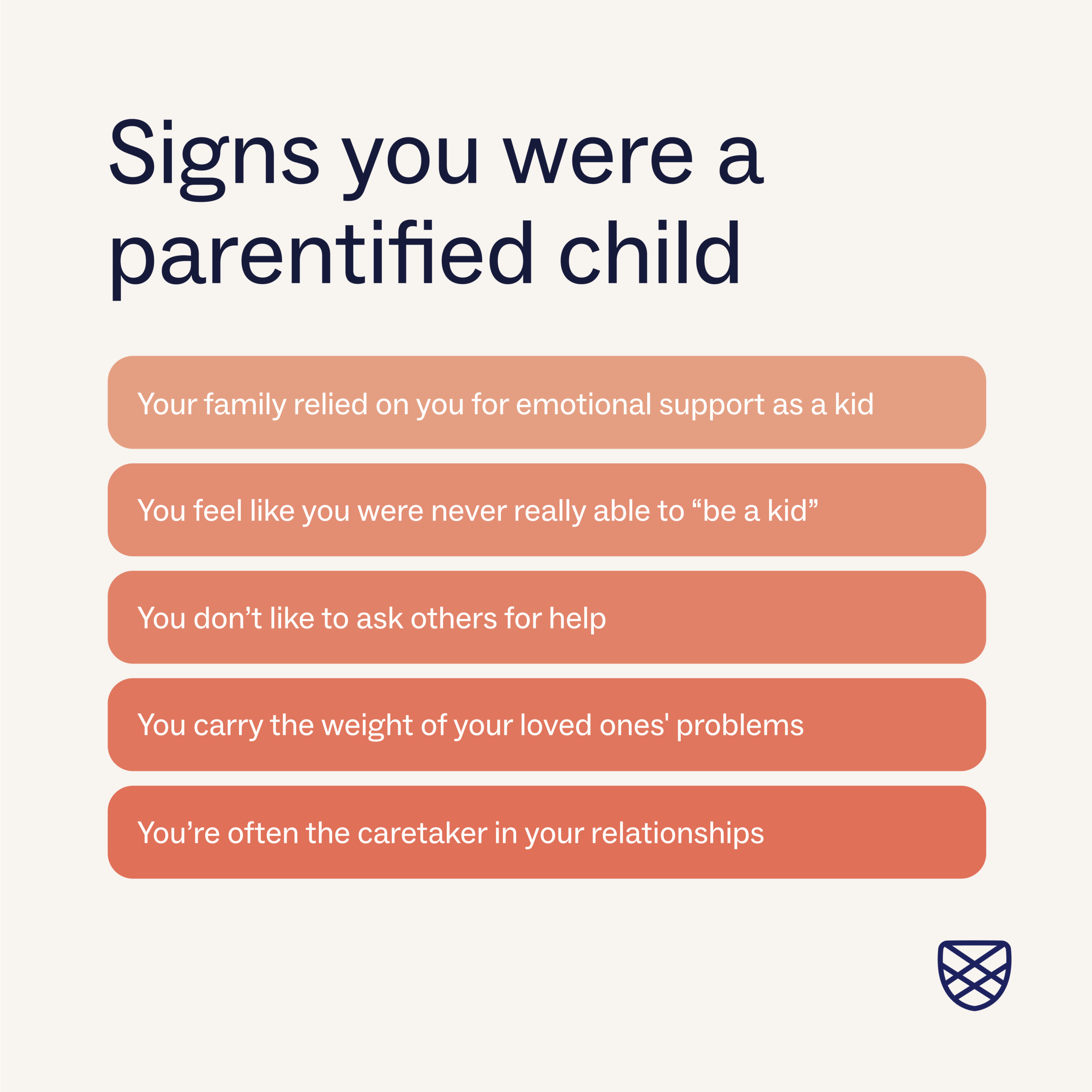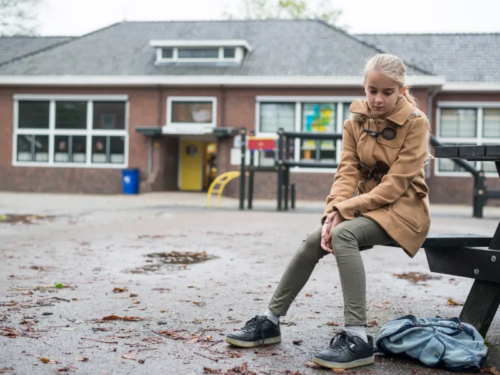
Table of Contents
Parentification Trauma: What it is and How to Heal
Written By: Charlie Health Editorial Team

Clinically Reviewed By: Dr. Don Gasparini
April 23, 2023
8 min.
We explore the intricacies of parentification trauma, its impact on individuals, and the path to healing and reclaiming one's own identity.
Learn more about our Clinical Review Process
Table of Contents
What is parentification?
Parentification is a term used to describe a situation where a child is expected to take on the role of a parent, either physically or emotionally. This can occur in various circumstances, such as when a parent is absent, emotionally unavailable, or struggling with their own mental health issues. While taking on such responsibilities may seem like a mature and responsible thing for a child to do, it can have a lasting impact on their mental and emotional well-being.

What is parentification trauma?
Parentification trauma refers to the negative effects that parentification can have on a child. It most often occurs when a child is expected to take on the role of a parent without the necessary support or resources to do so effectively. This type of trauma can lead to significant psychological distress and can be considered a form of emotional abuse. Parentification can be a significant burden for a child and can lead to long-term mental health issues.
Parentification trauma can lead to symptoms of PTSD, including flashbacks, anxiety, and depression. The long-term effects of parentification trauma can be devastating, and it is important to seek help if you are struggling with these issues.

We help survivors of trauma heal from home
Personalized treatment multiple times per week.
What are the types of parentification?
There are several types of parentification, each with its own set of challenges and impacts on children and adolescents. In general, though, parentification is a form of role-reversal. Role reversal throughout childhood can be particularly challenging as it can interfere with a child’s ability to develop their own identity and sense of self.
Here are some of the most common types of parentification:
Emotional parentification
Emotional parentification occurs when a child is expected to take on the emotional needs of a parent or caregiver. This can include providing emotional support, listening to the adult’s problems, or being a source of comfort and reassurance. Emotional parentification can be especially challenging for children as they may not have the emotional maturity or life experience to manage their own emotions, let alone those of an adult.
Instrumental parentification
Instrumental parentification involves a child taking on practical responsibilities that are typically the domain of adults. This can include managing household finances, caring for younger siblings, or taking on other practical tasks that are typically the responsibility of parents or caregivers. Instrumental parentification can be particularly challenging as it can interfere with a child’s ability to attend school, socialize with peers, and engage in typical childhood activities.
Sexualized parentification
Sexualized parentification occurs when a child is expected to take on sexual roles or responsibilities. This can include being exposed to sexual behavior or taking on the role of a partner or spouse for a parent. Sexualized parentification can be particularly harmful as it can lead to long-term psychological and emotional trauma.
It is important to note that these types of parentification can often overlap, and a child may experience multiple types of parentification simultaneously. Each type of parentification can have lasting impacts on a child’s mental and emotional well-being, and it is important for parents and caregivers to be aware of the signs of parentification and seek help if they suspect their child may be taking on parental responsibilities.
Why might parentification occur?
There are several circumstances that can lead to parentification, including parental substance abuse, mental health issues, divorce, death, and neglect.
When a parent is unable or unwilling to fulfill their role as a caregiver, a child may be forced to step in and take care of younger siblings, cook meals, clean the house, and even pay bills.
Another circumstance that can lead to parentification is when a parent relies too heavily on their child for emotional support. This can occur when a parent is going through a difficult time, such as a divorce or the loss of a job, and turns to their child for comfort and reassurance. While it is natural for a parent to seek support from their child, it becomes problematic when the child is expected to take on the role of a therapist or confidante.
This can be particularly damaging if the parent shares inappropriate or adult content with the child, which can lead to the child feeling overwhelmed, anxious, and uncertain about their own emotional boundaries.

Long-term effects of parentification trauma
The long-term effects of parentification trauma can be significant and can impact the child’s mental, emotional, and physical health of the parentified child well into adulthood.
Parentification can lead to feelings of anxiety, depression, and low self-esteem, as the child may feel responsible for their parent’s well-being and be unable to meet their own needs. The child may also struggle with boundary-setting and have difficulty forming healthy relationships in adulthood. They may have a strong need to please others, be overly responsible, and feel guilty when they cannot meet others’ expectations.
Parentification can also have an impact on a child’s physical health. As a child, they may have missed out on important developmental milestones, such as playing with friends or pursuing hobbies, because they had to take on adult responsibilities. As an adult, they may struggle with chronic stress and anxiety, which can increase the risk of developing physical health problems such as heart disease and autoimmune disorders.
In addition to the impact on the individual, parentification can also have an impact on the family dynamic. Siblings may resent the parentified child for taking on more responsibilities, and the child may feel isolated and unsupported. The family may struggle to communicate effectively, and the child may have difficulty expressing their emotions or asserting their needs. These challenges can lead to ongoing conflicts and challenges in adulthood, even after the child has left the family home.

Parentification and the highly sensitive person
Parentification can have a significant impact on individuals who identify as highly sensitive. Highly sensitive people (HSP) are individuals who have a more sensitive nervous system and are more attuned to the emotions of others. Parentification can intensify these sensitivities and make it challenging for HSP to establish boundaries and take care of their own emotional needs.
HSP who have experienced parentification may struggle with feelings of guilt and responsibility for the well-being of others, as well as a sense of not being able to meet their own needs.
They may also be more vulnerable to feelings of anxiety, depression, and burnout, as their heightened sensitivity can make it challenging to manage stress and emotional overload. It is important for HSP who have experienced parentification to seek support from mental health professionals who understand the unique challenges of being highly sensitive and can provide specialized care to help them heal from parentification trauma.
Parentification and the inner child
Parentification can have a significant impact on a person’s inner child, which is the emotional part of oneself that represents their childhood experiences and emotions. When a child is forced to take on a parental role, they may be denied the opportunity to have a childhood and may miss out on important developmental experiences. This can lead to an inner child who feels neglected, abandoned, and overwhelmed and who may struggle with feelings of shame, guilt, and anxiety.
Inner child work can be an effective approach for individuals who have experienced parentification trauma. Inner child work involves connecting with one’s inner child and working through past experiences to heal emotional wounds and develop a more positive self-image. This can involve activities such as visualization, journaling, and meditation, as well as therapy with a qualified mental health professional.
Through inner child work, individuals can learn to identify and address the emotional wounds that have resulted from parentification. They can develop self-compassion and self-care strategies, as well as learn to set healthy boundaries and prioritize their own needs. This work can also help individuals to develop a greater sense of self-awareness and acceptance as they learn to integrate their past experiences into their present-day lives.
How to heal from parentification trauma
If you have experienced parentification trauma, it is important to seek help. There are many resources available, including therapy, support groups, and self-help resources such as books and online resources. Healing from parentification trauma can be a long and difficult process, but it is possible with the right support and resources.
Here are some steps you can take to heal from parentification trauma:
Seek therapy
A therapist can help you work through the emotional pain and trauma associated with parentification. They can provide a safe space for you to talk about your experiences and assist you in developing coping strategies to deal with the long-term effects of parentification. As mentioned previously, engaging in inner child work during therapy can be a helpful exercise for individuals who have experienced parentification.
Do you need more support with
your mental health?
Charlie Health can help.
Practice self-care
Taking care of your physical and emotional needs is essential for healing from parentification trauma. This can include getting enough sleep, eating well, exercising, and engaging in activities that bring you joy and fulfillment.
Set boundaries
Setting boundaries is an important part of healing from parentification trauma. It can be difficult to assert your needs and wants after years of taking care of others, but setting boundaries is essential for your mental and emotional well-being.
Connect with others
Finding a support group or connecting with others who have experienced parentification trauma can be helpful in the healing process. It can help you feel less alone and provide a safe space to share your experiences and learn from others.
Educate yourself
Learning about parentification and the long-term effects it can have on mental health can help you better understand your experiences and develop strategies for healing.
Healing from parentification trauma with Charlie Health
If you are struggling with parentification trauma, it is essential to seek help from a qualified mental health professional. Charlie Health offers a range of services to support individuals who have experienced parentification trauma, including individual therapy, group sessions, and family therapy. Our licensed therapists use evidence-based practices such as cognitive behavioral therapy (CBT), dialectical behavior therapy (DBT), and trauma-focused therapy to help individuals process their experiences and develop coping strategies for dealing with the long-term effects of parentification.




